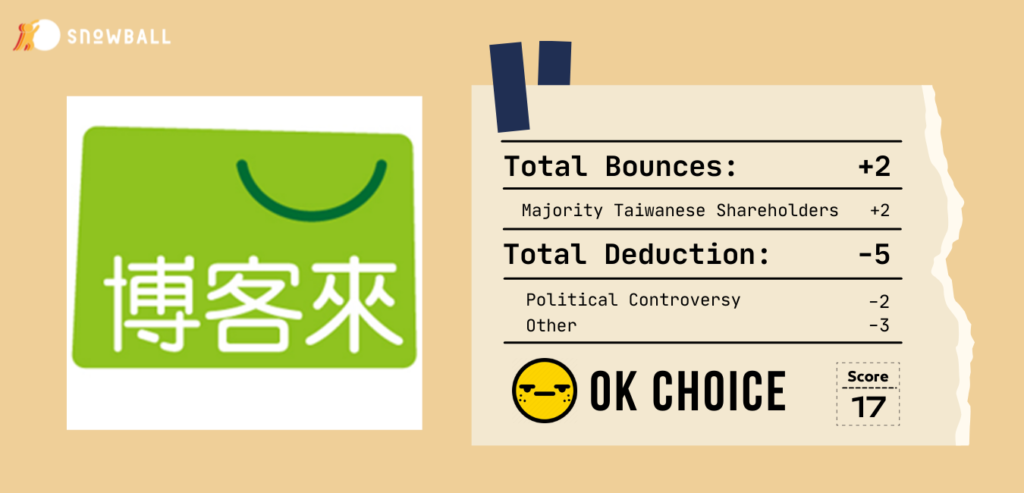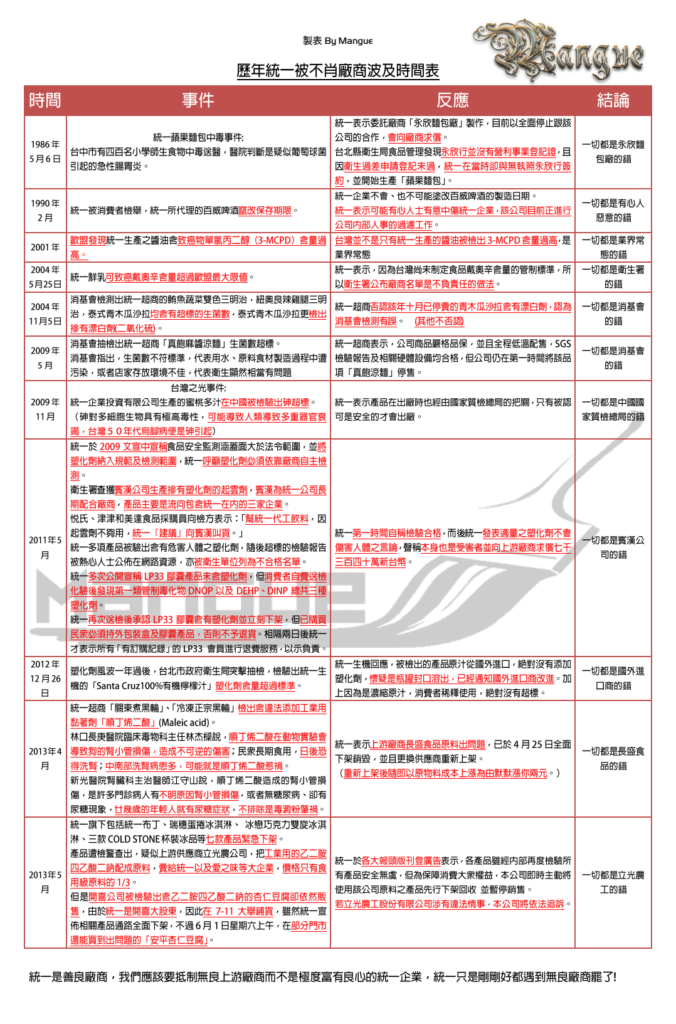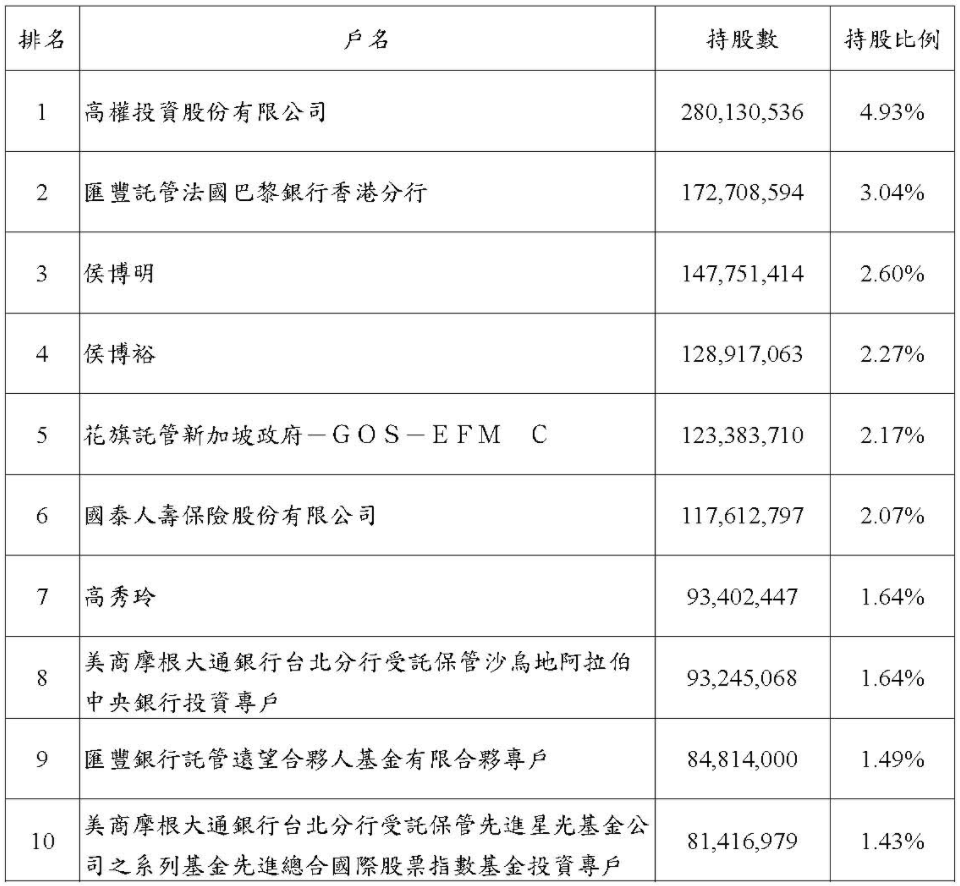
Summary
Books was founded by Zhang Tianli in 1995 and PCSC invested over 50% in 2001. PCSC is a Taiwanese fund company with large businesses around Taiwan, China and the Philippines. In the news, there is no obvious statement whether PCSC takes a pro-CCP or anti-CCP stance. Some people held a boycott of one of their companies, Uni-President, due to unsafe food checks. Also, Uni-President reportedly receives Chinese subsidies for its businesses in China.
Scoring Analysis
Ownership, Shareholders and Political Activity: +2
Books underwent a dramatic change inside the company since its founding. Zhang Tianli founded Taiwanese first online bookstore Books in 1995. PCSC purchased shares with a total price of approximately NT$100 million and acquired more than half of the shares of Books in 2001. Books now is under PCSC’s operation since the founder Zhang was fired by the Board in 2007. The parent company of PCSC is Uni-President, which is approximately 50% owned by Taiwanese. The score here is +2 instead of +3 due to less than full Taiwanese ownership and the many issues surrounding Uni-President.
Media Reputation, Public Controversy and Boycott Calls: -2
Uni-President has repeatedly used various unsafe raw materials and neglects the food safety check of their own food products. Some concerned citizens conducted a boycott campaign to avoid using its services and buying products from Uni-President. Food safety issues are a serious problem to people, especially since Uni-President is a large company and its products are popular amongst Taiwanese; hence, we deducted -2 for this.
Other: -3
Uni-President received Chinese subsidies for its businesses in China, but we haven’t found information about that money flow to subsidiaries in Taiwan (e.g., PCSC). Receiving money from the CCP is a concerning issue, so -3 for this.
Basic Information
Data Collection
博客來成立於1995年,是兩岸三地最早成立的網路書店。2000年與7-ELEVEN合作全球首創的「到店取貨付款」機制,開啟嶄新的電子商務交易模式。2001年統一超商投資博客來,博客來加入統一流通次集團(PCSC)。之後銷售圖書以外產品,逐年擴大影音、百貨商品的經營範圍;2011年更換新的企業識別系統,強調博客來不只是書店的品牌新形象。博客來以文化商品為核心,2009年起已成為臺灣圖書市場銷售第一大通路,也是國內影音銷售通路的第一大品牌。未來將持續以會員的需求為目標,致力提供能滿足符合其所喜愛的商品,打造質感生活的新入口。
Source:
博客來數位科技股份有限公司
https://www.ir-cloud.com/taiwan/1216/irwebsite_c/index.php?mod=pages&id=19
https://fubon-ebrokerdj.fbs.com.tw/z/zc/zck/zck_2912.djhtm
 https://www.7-11.com.tw/company/ir/majorshareholders.html[/caption]
https://www.7-11.com.tw/company/ir/majorshareholders.html[/caption]
統一流通次集團成員介紹: https://www.7-11.com.tw/company/about/download/CE/2011PCSC_PS_02.pdf
 http://library.taiwanschoolnet.org/cyberfair2005/mhups/left/L04-3.htm[/caption]
http://library.taiwanschoolnet.org/cyberfair2005/mhups/left/L04-3.htm[/caption]
On August 17, 2007, Zhang Tianli was fired by the company he founded at the Board Meeting.
In 1995, Zhang Tianli founded Taiwanese first online bookstore. In 2001, PCSC purchased shares with a total price of approximately NT$100 million and acquired more than half of the shares of Books. In 2007, he left Books because of his disagreement with the major shareholder. The management opinions of Zhang Tianli and PCSC appointed Books CEO Xie Jiannan were opposed. PCSC emphasised the localisation of physical channels; however, Books wanted to enter the international market (e.g. China). Zhang Tianli strongly recommended Books enter into China’s market, but it was rejected by the board of directors.
Source:
https://www.bnext.com.tw/article/36930/BN-2015-08-04-181827-34
Zhang Tianli Oppose Cross-Strait Agreement on Trade in Services: if Books become Chinese-funded, would you still feel safe to buy books?
“If Chinese actually controls the channels of Taiwan’s bookstores, is it possible to publish and release the democracy relative and Falun Gong books?” Many Taiwanese publishing houses have printing companies as the shareholders behind them. Even if the publishing industry is not open, they will be influenced or even flanked by the mainland. Cross-Strait Agreement on Trade is harmful to Taiwan.
自由時報:《服貿研討會》張天立:如果博客來變中資 你還敢買書嗎
Many Taiwanese companies have been receiving Chinese subsidies for a long time, causing more doubts about the impact of the economy
After 2016, China’s subsidies to some Taiwanese enterprises have increased substantially. Including Want Want, Hon Hai Group and the two major food companies, Uni-President Group and Master Kong. Since 2004, Uni-President Foods Group has obtained Chinese capital of NT$957 million, and in 2017 it increased significantly from NT$43.28 million to NT$135.86 million.
Source:

The scale of China’s industrial subsidies
In 2011, China’s subsidies to Uni-President US$9 million (approximately NT$ 270 million), accounting for 18.2% of the company’s net profit.
Source:
The Economist: Perverse advantage. A new book lays out the scale of China’s industrial subsidies

Discussion
There is barely reported News left on the issue about Uni-President’s food safety. Uni-President has repeatedly used various unsafe raw materials or packaging materials. Whether it is a plasticizer incident or a poisonous starch incident, Uni-President has not fulfilled the responsibility and obligation of a good manufacturer. After the incident, Uni-President refused to apologize to consumers. Their unanimous statement is that Uni-President is also a victim, and they never mention their responsibilities for failing to fulfil the food safety checks. Many people started a campaign to boycott Uni-President, yet many netizens also claim that the businesses of Uni-President are various and with a large number located in Taiwan, it is difficult to avoid using and boycott the products of Uni-President in Taiwanese daily life. A netizen made a timeline of the controversial issues that Uni-President has done.

Netizens comments/discussion about the boycott
https://blog.xuite.net/save_beauty/blog/46441431
https://www.facebook.com/131137820253652/posts/585392868161476/

